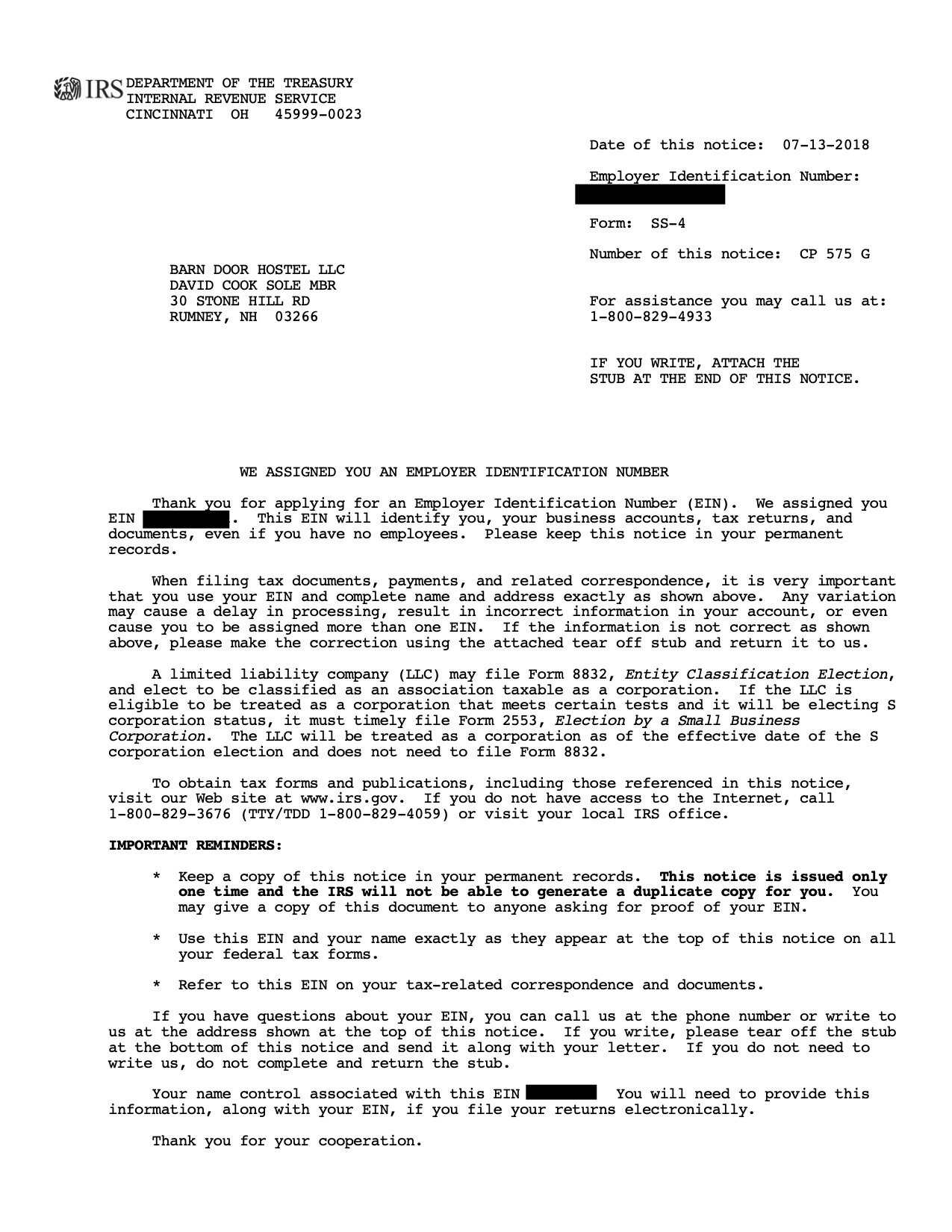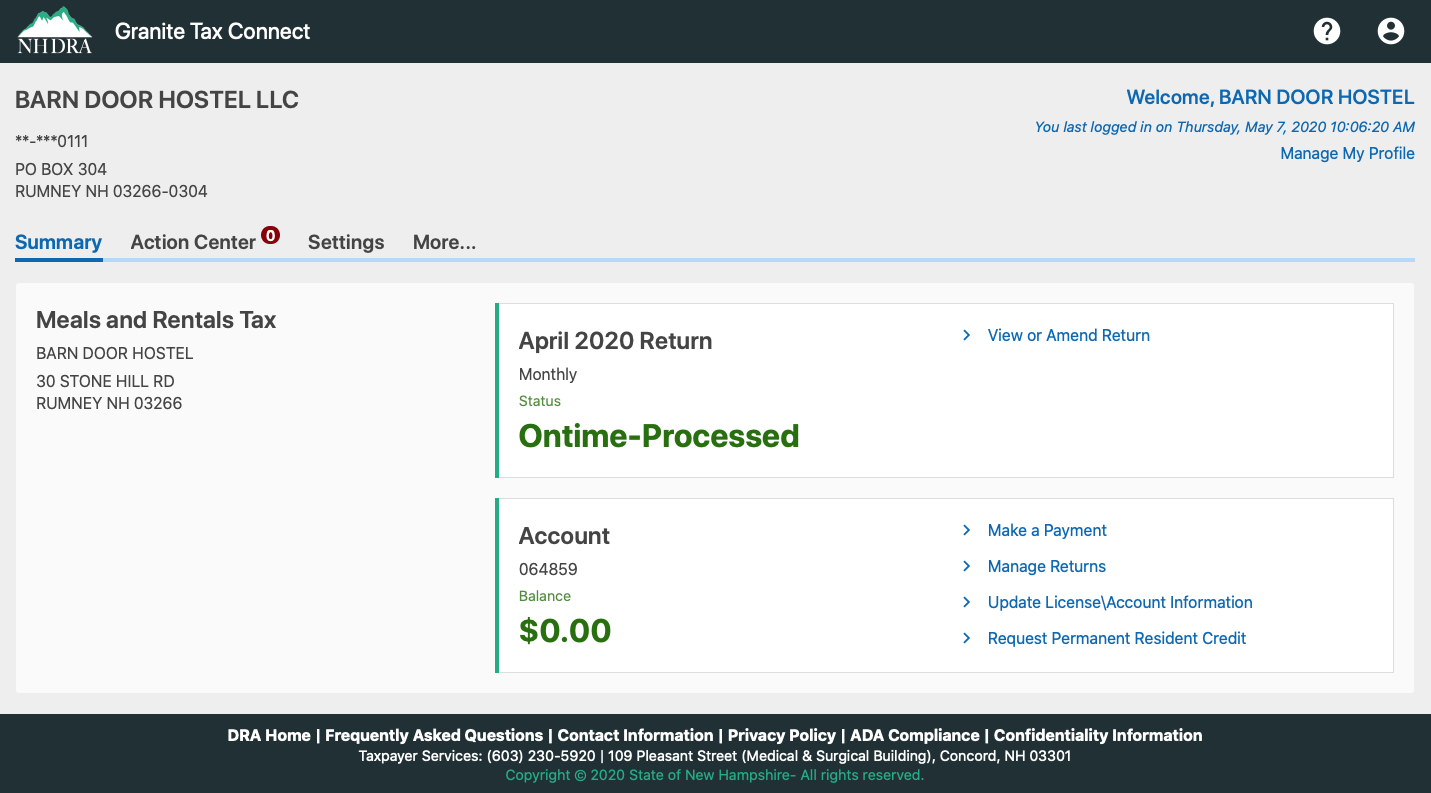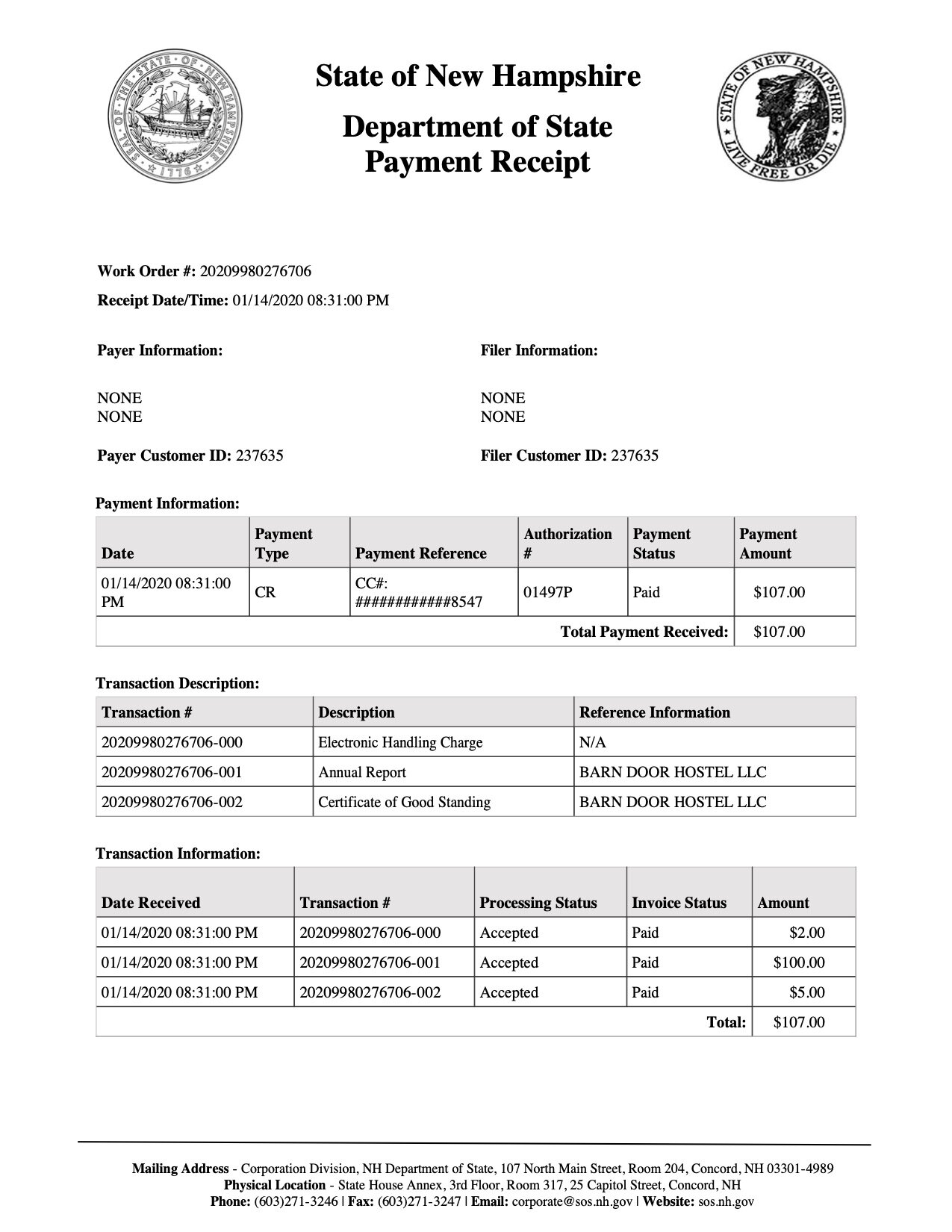Write in the comments below what you’d like to learn more about and we will write a post with our experiences
Business Setup
Register Your Company:
You’ve got tons of options. Some are better than others. Some are dependent on how your company is structured and/or your mission. You can file as an LLC, an S-Corp, a nonprofit organization…the list goes on. You can consult a business attorney, LegalZoom, or your uncle Phil who sells one of a kind Hawaiian shirts at the local farmers market. Barn Door Hostel chose to file as a Limited Liability Company (LLC).
if you don’t want your type of company (eg LLC) at the end of your name on everything, file a Doing Business As (DBA*) for whatever you actually want your company to be called. example: Instead of “Barn Door Hostel LLC” written on everything, we’ve filed a DBA under “Barn Door Hostel” as well as “Barn Door Hostel & Campground”. *If you choose not to file a DBA (for an LLC at least), you are required by law to have LLC on basically everything. Signage, business cards, emails, websites, receipts, etc. It’s annoying and ugly for some, its totally fine for others. Ultimately its up to you as the business owner what you want to portray to your customers. Once you register, you will get something called an Employer Identification Number-or EIN (this is basically your businesses social security number). Depending on how you register, you may not get an EIN and in fact use your real personal SSN for the business. When you file, You’ll get a document from the IRS that looks similar to the one below:
File Your Taxes Monthly:
Once you register as a lodging establishment, you are required to collect a 9% Rooms (and Meals) tax per customer. This is per customer. Make sure you keep accurate records of these collected taxes as you will have to report them to the NH government once per month (usually due on the 15th of the month for the previous months activities) This is done on the Granite Tax Connect website. It will look something similar to the image below. You need to create an account with the website (using your EIN).
Make sure your business is in good standing (once a year)
Register your business with NH Quickstart (usually done when you form your business). You need your EIN, business name, your name and some other essentials. In order for the NH government to understand that you’re still a real functioning business who doesn’t owe anyone anything, you need to make sure your business is in good standing. This is done by logging in th NH Quickstart once per year (around the time you formed your company) and paying a fee. Here’s a receipt of Barn Door Hostel’s most recent “Good Standing” transaction
Business Insurance:
This one is tricky. Tons of insurance companies in the state, and the nation, don’t really want to be associated with hostels as they have bad reputations and/or are “new” or “unheard of”. One company that we work with (we have multiple insurances for multiple things [homeowners, property, campground, business]) is E + S Insurance Services. Our agent is Eleanor (the E in the name) and she is an absolute sweetheart of a woman who is very patient and understanding of small business needs. We tried other companies (that currently insure hostels in New Hampshire) and were told that none of these insurance companies are accepting any more hostels as clients. This may change in the future but for now, E + S is highly recommended.
Any other business formation information we forgot? Let us know in the comments
Processing Payments
Credit Card Processing Fees. We all hate them. Below are the current (as of May 10 2020) fees for some of the most popular processing companies
These all have programs/offers to receive free readers (or readers not needed) for their payment services.
Stripe: 2.9% + $0.30
Square: 2.6% + $0.10
Square (type in manually): 3.5% + $0.15
Paypal (online): 2.9% + $0.30 (4.4% if outside US)
Paypal (in person): 2.7% (4.2% if outside US)
Paypal (manual entry): 3.5% + $0.15
Clover was excluded due to the membership fee/product fee required to process payments
I’ve included manual type in and online transactions because we are in times of COVID-19. Alternative payment methods (ie over the phone or online) are increasingly popular to help stop the spread of the virus
The Best
Physical Card Present
$100 or less: PayPal
over $100: Square
Manual Entry:
$25 or less: Square or PayPal
over 25: Stripe
Online:
Square
These fees do not take into consideration any other “hidden” fees. For example: I sell tee shirts and gear on my website. My website is hosted on squarespace. The type of account I have on Squarespace has additional fees which are essentially end up doubling the amount of money you are paying in fees. Stripe is integrated into Squarespace’s platform (and not Square-which would be better) but collects its own fees as outlined above. I can pay more per month to get rid of these Squarespace fees but choose not to because it’s not worth it for us.
Alternative Options:
There are plenty of options out there to accept payment that don’t require a card at all. Many of these are free of charge (that’s right…no fees!)
Good ole US Government Issued Legal Tender ie CASH (IS KING)
Venmo
CashApp
PayPal (transfer rather than cc processing)
Apple Pay
Zelle
Google Pay
These are the most common ones you will come across. Of course, you can utilize different features on every one of these app/services listed (in the entire article, not just immediately above) to cut down on fees. For one example: you can send people “Invoices” on Square". This costs you 2.9% = $0.30 per invoice (lower than the manual type in) but you run the risk of people just simply not paying them. There’s also the scenario where the invoice goes to spam, or the wrong number, or the number doesn’t get texts, or you mistyped the email address etc etc. I simply skip the Invoice feature altogether since it has caused me MANY headaches while working at International Travelers House in San Diego.
Side note: i try very much to avoid any service (mainly reservation software) that automatically/requires a deposit charge. For example the reservation software “HostelSnap” requires a deposit. This costs you a cc processing fee. The guest then pays the remainder when they get there (another cc processing fee if they use their card) [Additionally HostelSnap charges per transaction—rather than having a monthly fee] so you can weigh your options and see what works for you. It doesn’t work well for Barn Door Hostel as most of our guests are paying cash, our rates are already low, and hate fees.
For anyone interested in my methods of calculations: I graphically plotted each function and found the intersecting point to figure out the $25 and $100 price points stated above.
The functions I used were
Stripe: y=x-(x(0.029)+0.30)
Square: y=x-(x(0.026)+0.10)
Square (type in manually): y=x-(x(0.035)+0.15)
Paypal (online): (same as stripe)
Paypal (in person): y=x-(x(0.027))
Paypal (manual entry): (same as square manual type)
To find the intersecting points just set the Y functions equal to each other. If the intersection is negative on x axis, then the upper function is always better
Let me know what you think in the comments below. Did I miss something? Mess up on maths? (its been a long time since plotting functions)
Looking forward to your input!!
Fire Safety
The topic that sparked the flame (pun intended) to create the NH Hostels Network. This topic is tricky and has lots of nuances but the main takeaways are as follows
Sprinkler Systems…You need one (by law) if:
your building accommodates 17 or more guests
You built a new building (that accommodates more than 4 people)
You changed the use of the building (for example- from a shed or barn into overnight accommodation space)
These bullets (and more info) can be found in this document www.nh.gov/safety/divisions/firesafety/bulletins/documents/06_bedandbreakfast.pdf
This document also explains the needs for: smoke alarms, window (emergency egress) size, and two clearly marked exits. These factors correlate with International Building Code, which further dives into doorway sizes, window sizes, railing heights etc etc. The full IBC book can be purchased here www.iccsafe.org/products-and-services/i-codes/2018-i-codes/ibc/ If you are doing your own renovations/construction, this is a must have. If you are hiring a contractor, they should already be well versed in this knowledge-as well as New Hampshire State Building Code and commercial business building code.
Sprinkler System Design/Installation Companies:
There are several in the state of New Hampshire. I personally loathe and absolutely DO NOT recommend Life Safety Protection. They have taken over 1.5 years to install our system and have blindsided us step after step with new charges, changes, functionality issues etc. Again, I David Cook, DO NOT recommend Life Safety Protection for your installation. I don’t want anyone to be subject to their asinine work ethics/methods/reoccurring issues/poor staff performance etc etc. Below is a list of GOOD designers/installers:
John L Carter Sprinkler Company Inc. (www.cartersprinkler.com)
Hampshire Fire Company LLC (www.hampshirefire.com)
Fire Protection Team LLC (www.fpteam.com)
Tri State Fire Protection (www.getfireprotection.com)
With each sprinkler system, you will by law, need TWO phone lines run/installed and hooked up to the monitoring system. This is a reoccurring monthly charge from your local phone (make sure its a plain old telephone system [aka POTS]) provider (ie not spectrum or other digital services). The monitoring system is often not included by the installation/design company and will also require monitoring, by law. Companies that offer monitoring
Progressive Alarm (www.progressivealarmnh.com) <— This is who we currently use and were the cheapest we could find
as well as SOME of the design/installers listed above. Please consult them for their offerings
If you are not on city water (ie well water) you will need reservoir tanks in addition to your fire pump/monitor. The tank size is dependent on building size and will be determined by the design company. This will be included in your final proposal before work begins. Barn Door Hostel's entire fire pump/alarm/monitor and tanks are contained in a room 16feet by 16feet. The room itself gets its own sprinkler head. Again, this will be included in the design. Make sure this room is well insulated so water pipes/tanks don’t freeze in the cold winter months.
In addition to your new (dual) phone bill and your new monitoring bill, you will also by law be required to run a separate power line to the pump you just installed, so now you will have a new electric bill as well-how fun! This is required by law in the state of New Hampshire. The pump’s specific power will get its own CT Cabinet (similar to a meter on the side of your house) or a meter (depending on size of pump and your local power supply company’s engineers discretion. This is for your own safety. If the fire department responds to an emergency at your property and they suspect an electrical fire-the first thing they will do is cut the power. Now thankfully your pump has its own power, so it will not be turned off and continue to operate-spraying water until your fire department turns it off. 9 times out of 10, your monitor, alarm panel, and fire pump will require a specific electrocution (not just your run of the mill electrician). Barn Door Hostel utilized Alex “Al” Barnardi from Plymouth Mountain Electric (www.facebook.com/PlymouthMountainElectric/), who did a fantastic job and was very good at communicating every step of his progress. He services a large radius in New Hampshire
Speaking of fire departments. They will also need an exterior hookup into your main sprinkler line. This should be included in your proposal before work begins. Barn Door Hostel has two hookups…one directly in front of the building (opposite side from where the pump/tanks are) and one hook up on the back side of the building (directly next to the pump and tanks).
If you have a specific stove/cooktop size, your design company may require a “kitchen specific” fire suppression system in addition to your normal sprinkler getting installed. often times these are commercial grade and have foam rather than water as a retardant. This is ultimately up to the NH State Fire Marshall office, your town’s restrictions, and the design team.
Fire Safety:
Extinguishers: You should at the very least have manual (hand held) fire extinguishers placed sporadically throughout your establishment. Barn Door Hostel utilizes a company that mounts/monitors/inspects/exchanges these extinguishers each year so we don’t have to worry about them. The company is called United Safety Services LLC (https://www.facebook.com/United-Safety-Services-LLC-154771998035176/ )
Drywall: Again, according to International Building Code laws, a true firesafe room is a double layer of 5/8” thick drywall. This is pretty intense. Consult your local Fire Chief or the State Fire Marshall to see what they recommend. They allowed Barn Door Hostel to install a single layer of 5/8” drywall which was PLENTY (those suckers are heavy as hell).
Exit signs/Emergency Lights: These are required by law, must be illuminated, and placed strategically (by an electrician) and hardwired so even if the breaker flips off, the lights and signs are still on. Throw a couple extra emergency lights (without signs) in hallways to illuminate pathways or obstacles (such as tops of stairs, large furniture etc)
Smoke/CO2 Detectors: By law, these must be hardwired and linked. They make fancy ones that are still linked but actually not hardwired except for one or two. These are acceptable and pretty rad! We got these installed and they work like a charm. If you’re doing anything dusty, make sure to cover these with a shower cap to not set them off-and take them off when you’re done
Doors and windows: check with your local contractor for what the legal requirements are in terms of size number, placement, exterior ladders (for second floors) etc as well as steel doors (not wood). [Our local chief and state Marshall has given Barn Door Hostel permission to utilize wooden doors with the extent of overkill we have put into fire suppression.]
Signage: On the back of each door you should have a map of how to get out (and a copy of the New Hampshire Lodging/Restaurant Association’s Innkeeper Liability document) as well as emergency numbers. Yes! post the number “911”, yes! post the non emergency number for your local fire department (as well as name of nearest hospital), and yes! post your current location. The info should look something like this—>
Emergency Phone Number 911
Non Emergency Fire Department Number (603) XXX-XXXX
Closest Hospital XXXXXXX Hospital located at XXXXXXXXXXXXX
You’re currently located at XXXXX Hostel in XXX room at XXX Road in XXX town New Hampshire
Employee Training: Make sure your staff are trained and knowledgable about your Emergency Action Plan (and make sure you HAVE an Emergency Action Plan). Make sure they are mindful of where circuit breakers are, what their rolls are in case of a fire (ushering? checking rooms? suppressing?)
Please let me know in the comments below if I’ve missed any pertinent details or if you have questions. Many of the laws I have stated are searchable on the nh.gov website and/or by giving a call to the local chief, state marshall, or town/state offices affiliated with the issue at hand.
If anyone wants to check out our fire suppression setup, please call/text Barn Door Hostel at (603) 254-1700. I’d be glad to show you what we have.



